Search Clinical Trials
Our researchers are currently in need of adult and pediatric study participants to help us pursue better treatments and cures. Participants may receive medical evaluations and procedures, study medication, disease-related education and possible financial compensation for time, travel and participation.
Select a Condition or Specialty
- Allergy
- Alpha-1 Antitrypsin Deficiency
- Asthma
- Bronchiectasis
- Cardiology
- Chronic Obstructive Pulmonary Disease (COPD)
- COVID-19 (Coronavirus)
- Cystic Fibrosis
- Eczema (Atopic Dermatitis)
- Environmental & Occupational Health
- Eosinophilic Granulomatosis with Polyangiitis (EGPA)
- Food Allergy
- Gastroenterology
- Idiopathic Pulmonary Fibrosis (IPF)
- Interstitial Lung Disease (Pulmonary Fibrosis)
- Lung Cancer
- Nontuberculous Mycobacteria (NTM)
- Oncology
- Pulmonary Hypertension (PH)
- Respiratory (Pulmonary)
- Rheumatology
- Sarcoidosis
- Sleep
All Clinical Trials

Exploring New Investigational Topical Treatment for Moderate Eczema
Researchers are investigating a potential new, non-steroid skin cream for moderate eczema in children and teens who have not responded well to other topical eczema treatments. Volunteers are needed. Learn how your child can participate.
- Gender
- Any
- Ages
- 6-17
- Compensation
- Provided
- Time Required
- up to 16 clinic visits over 70 weeks

AURORA Study: Preventing Further Lung Damage in IPF
Researchers are actively looking for clinical trial participants to explore the effectiveness of a new investigational idiopathic pulmonary fibrosis (IPF) treatment. Those who participate can help us work toward potentially preventing further lung damage for those affected by IPF.
- Gender
- Any
- Ages
- 40+
- Compensation
- Provided
- Time Required
- 10 visits over about 40 weeks.

New Combination Treatment Options for Non-Small Cell Lung Cancer
The COPERNICUS study needs volunteers with advanced non-small cell lung cancer. Participants will receive an investigational combination treatment to see if it can slow cancer progression.
- Gender
- Any
- Ages
- 18+
- Compensation
- Provided
- Time Required
- Up to 36 months, with 20 clinic visits over the first year, one visit every three weeks for a follow up period, and a finalization period with a visit every 12 weeks until the conclusion of the study.

Healthy Participants Needed for Lung Inflammation Study
Researchers need healthy volunteers to help study how the immune system helps the lungs repair damage from inflammatory diseases.
- Gender
- Any
- Ages
- 18-50
- Compensation
- Provided
- Time Required
- Three study visits, with the first visit lasting 1-2 hours and last two lasting about 6-8 hours each.

Potential New Treatment for Non-CF Bronchiectasis
Researchers are investigating if a new investigational drug could be the first approved treatment for non-CF bronchiectasis (NCFBE), a rare chronic lung condition. Volunteers with the disease are needed for a new study.
- Gender
- Any
- Ages
- 18-85
- Compensation
- Provided
- Time Required
- 6 study visits over at least 29 weeks
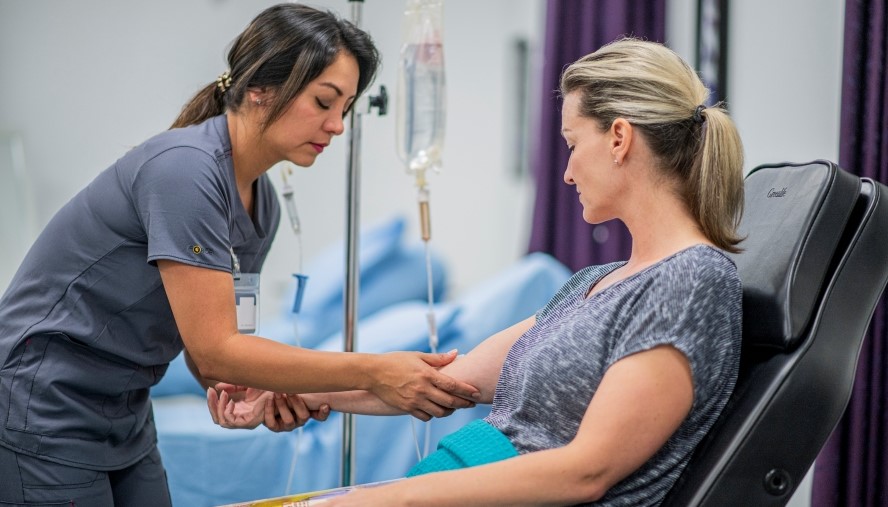
Potential New Medication for Hearing Loss from Antibiotic Use
Researchers are investigating a new medication that may be able to reduce or prevent hearing loss in patients with NTM who are treated with amikacin, a common IV antibiotic.
- Gender
- Any
- Ages
- 18-80
- Compensation
- Provided
- Time Required
- Up to 10 visits over a maximum of 129 days (roughly 3 months)

Can Skin Bacteria Treat Atopic Dermatitis?
A new study is evaluating if a type of bacteria that normally lives on the skin can help reduce eczema symptoms. Volunteers 12 years and older are needed.
- Gender
- Any
- Ages
- 12+
- Compensation
- Provided
- Time Required
- 7 study visits over approximately 20 weeks

AIM4: Testing Dupilumab with Other Asthma Treatments
Researchers want to know if combining an injectable medication called dupilumab with inhaled asthma medication can help people with uncontrolled asthma more than increasing the dose of their inhalers. Volunteers with asthma are needed for this study
- Gender
- Any
- Ages
- 18-80
- Compensation
- Provided
- Time Required
- 9 clinic visits over approximately 58 weeks

Can PAH Be Detected by Retinal Scan?
Researchers are trying to detect pulmonary arterial hypertension, or PAH, early using retinal scanning technology. Volunteers with or at risk of PAH are needed for this study.
- Gender
- Any
- Ages
- 18+
- Compensation
- Provided
- Time Required
- Two study visits over 6 months if you have PAH, or 12 months if you are at risk of PAH

ASPIRE: Potentially Slowing Lung Fibrosis in IPF
Researchers are examining whether an investigational medication called buloxibutid can slow down lung scarring and improve breathing for people with idiopathic pulmonary fibrosis (IPF). Volunteers are needed. Learn if you are eligible for the ASPIRE IPF trial
- Gender
- Any
- Ages
- 40+
- Compensation
- Provided
- Time Required
- 8 clinic visits and 8 phone or video calls over approximately 62 weeks.

Potential New Treatment for EGPA to Reduce Need for Oral Steroids
Researchers in this clinical trial want to determine if a new investigational treatment called NS-229 can help people with EGPA experience remission of their symptoms or reduce the need for oral steroids.
- Gender
- Any
- Ages
- 18+
- Compensation
- Provided
- Time Required
- 11 visits over 36 weeks (9 months). The first treatment visit will last up to 8 hours, and all other study visits will take approximately 3 hours.

Discovering New Ways to Treat Modulator-Ineligible CF
The REACH Study is a long-term, observational study aiming to gather high-quality data on people with cystic fibrosis (CF) who cannot benefit from CFTR modulators. By collecting core data, REACH will help develop and assess future therapies for this population.
- Gender
- Any
- Ages
- 12+
- Compensation
- Provided
- Time Required
- 4 clinic visits over the course of a year, at enrollment, 3 months, 6 months and 12 months.
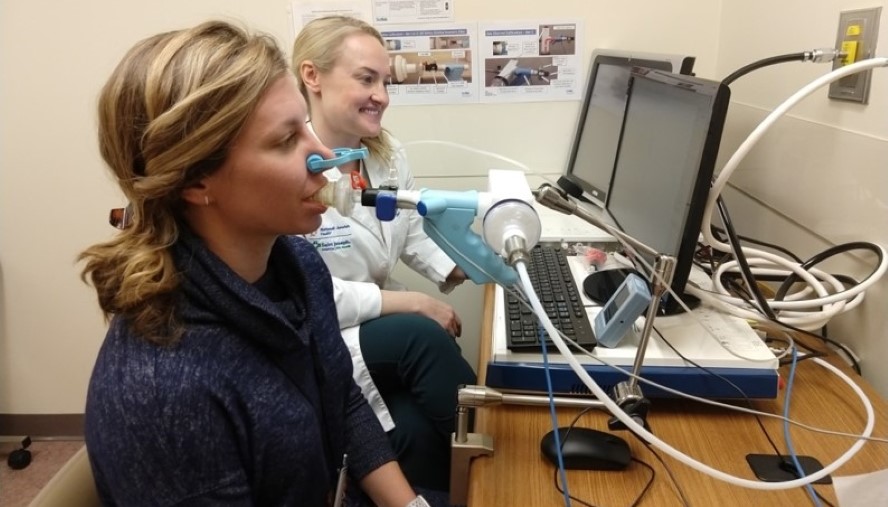
LCI Testing Possible Tool for Identifying ILD Risks in Scleroderma Patients
Lung clearance testing may give researchers a new tool to predict people with scleroderma who are at risk of developing interstitial lung disease. Volunteers are needed for a one-visit clinical trial.
- Gender
- Any
- Ages
- 21-75
- Compensation
- Not Provided
- Time Required
- One 60-minute clinic visit, followed up by one phone call a year for the next 5 years.

Can Combination Rescue Inhalers help Adolescents Control Asthma Flare Ups?
Researchers with the ACADIA Study are trying to determine if a rescue inhaler that doctors can currently prescribe for adults can also help adolescents control their asthma flare-ups. Volunteers are needed. Learn if you are eligible:
- Gender
- Any
- Ages
- 12-18
- Compensation
- Provided
- Time Required
- Approximately 58 weeks (13 months).

Understanding Common Insomnia Treatments in Adults
Chronic insomnia is a serious health concern that affects around 10% of people in America. Current treatments are varied, and often target things that may result in sleep disruption. In this study, researchers are evaluating two common treatments for insomnia in adults to learn more about how they treat symptoms.
- Gender
- Any
- Ages
- 18+
- Compensation
- Provided
- Time Required
- Visits and home data collection over approximately 9-12 months. Some visits can occur virtually.

The MIST Clinical Study for PPF
Progressive Pulmonary Fibrosis (PPF) is a rare lung disease that causes scarring in the lung. Researchers are investigating if an inhaled study treatment can help improve lung function with fewer side effects than current treatments.
- Gender
- Any
- Ages
- 18-80
- Compensation
- Provided
- Time Required
- 12 in person visits and 1 phone visit over 56 weeks (13 months), with twice a day nebulizer treatments.

Possible New Inhaled Treatment Option for PH with ILD
Pulmonary hypertension (PH), or high blood pressure in the lungs, can often develop in those who have interstitial lung disease (ILD). Treatments for this combination of diseases, called PH-ILD, to try and improve quality of life for people with both conditions are currently being evaluated.
- Gender
- Any
- Ages
- 18-75
- Compensation
- Provided
- Time Required
- Six visits over approximately 52 weeks, with two initial visits for enrollment and then visits at weeks 8, 16, 24 and 52.
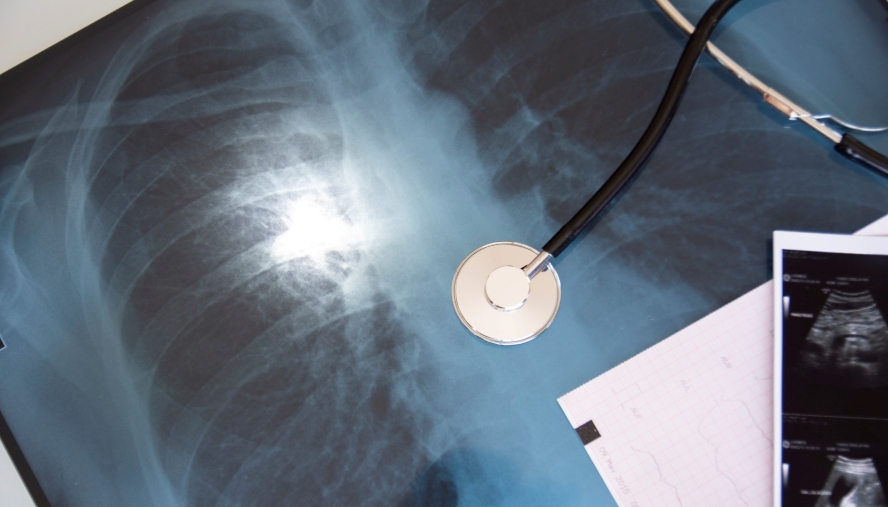
Differences in the Pulmonary Artery of People with Pulmonary Hypertension
Pulmonary hypertension and pulmonary arterial hypertension are two conditions that can cause increased blood pressure within the lungs. The differences between the two conditions on a cellular level are not well understood, and researchers are evaluating cell samples from people that are undergoing a right heart catheterization to learn more about these two diseases and improve future care.
- Gender
- Any
- Ages
- 18+
- Compensation
- Not Provided
- Time Required
- One visit to review and sign consent before scheduled procedure and three follow-up phone calls (once a year for three years).

XTMAB-16: A New Drug to Reduce Steroid Use in Sarcoidosis
People with pulmonary sarcoidosis usually rely on corticosteroids to help manage symptoms. Researchers are investigating the safety of a new study drug called XTMAB-16 to see if it can help reduce corticosteroid use while treating the disease.
- Gender
- Any
- Ages
- 18-80
- Compensation
- Provided
- Time Required
- Part A: A screening period for up to 42 days, followed by 12 weeks of treatment, including up to 13 clinic visits. Part B: A screening period for up to 42 days, followed by 24 weeks of treatment, including up to 19 clinic visits. After completing either part, participants will have the option to join an extension study. They will be monitored for 6 weeks after their last dose of the medication for safety and immunogenicity assessments.

Possible New Treatment for CF and NTM
Researchers in the ABATE Study are testing the safety of a drug called gallium nitrate for people with cystic fibrosis (CF) who also have been diagnosed with nontuberculous mycobacteria (NTM).
- Gender
- Any
- Ages
- 18+
- Compensation
- Provided
- Time Required
- 8 in-person visits, including two 5-day inpatient stays, and 4 phone calls over 28 weeks

Effects of Keto Diet in People with HFpEF
The keto diet has helped many people lose weight and improve their overall health. Researchers are investigating if it can also benefit people with a specific type of heart failure.
- Gender
- Any
- Ages
- 21-79
- Compensation
- Provided
- Time Required
- 12-week post-study testing is complete. There will be an option to enroll in a 12-week extension arm (for a total of 24 weeks). Primary study commitment will involve a total of 9 visits

Treating Deployment-Related Asthma with Supplements
Many people returning from military deployment have developed asthma as a result of inhaling hazardous materials. Exposures to diesel, burn pits, biomass smoke and sandstorms during deployment likely play a role. Some people with deployment-related asthma do not respond well to standard asthma medications.
- Gender
- Any
- Ages
- 18-70
- Compensation
- Provided
- Time Required
- 5-6 clinic visits over 18-22 weeks

BEACON-CF: Investigational mRNA Therapy for Cystic Fibrosis
For many people living with cystic fibrosis, there are treatments available called cystic fibrosis transmembrane conductance regulator (CFTR) modulators that can help treat the underlying cause of cystic fibrosis. However, more than 5,000 people living with cystic fibrosis have a change in both of their CFTR genes that makes them not expected to benefit from CFTR modulators.
- Gender
- Any
- Ages
- 18-65
- Compensation
- Provided
- Time Required
- 28 weeks with 8 in-person visits and 4 phone calls.
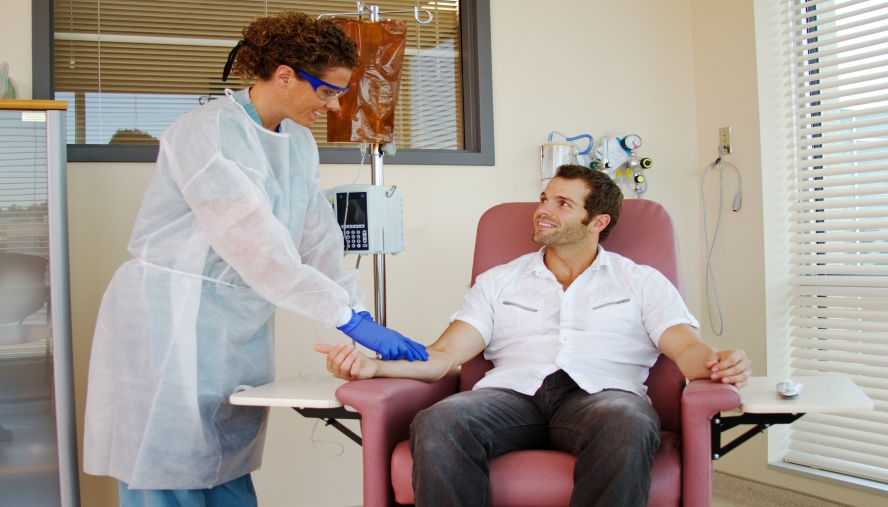.jpg?lang=en-US&ext=.jpg)
PRA023 for Systemic Sclerosis with Interstitial Lung Disease
Researchers are studying a new medication called PRA023 that has anti-inflammatory and antifibrotic properties to determine how well it works against systemic sclerosis (SSc) with interstitial lung disease (ILD).
- Gender
- Any
- Ages
- 18+
- Compensation
- Not Provided
- Time Required
- Monthly visits over 50-week timeframe
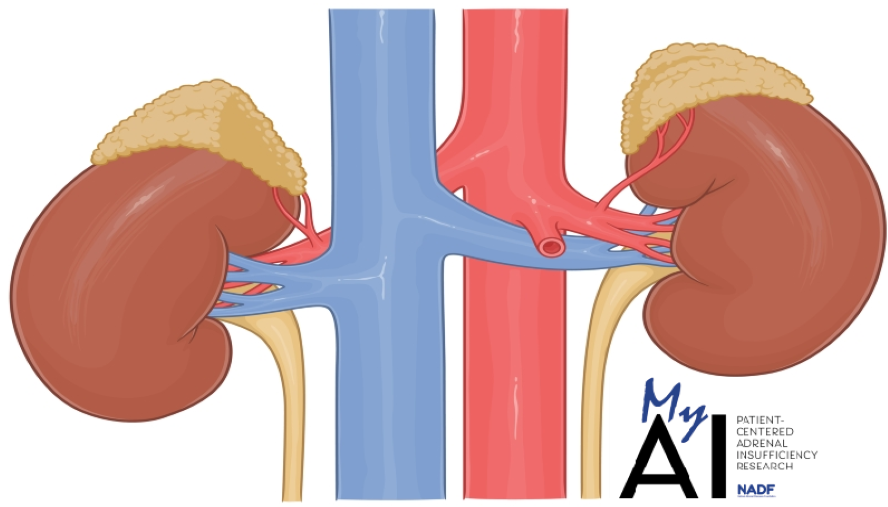.png?lang=en-US&ext=.png)
MyAI Registry for People with Adrenal Insufficiency
To help better understand adrenal insufficiency (AI) and its progression, researchers have developed a new registry called MyAI.
- Gender
- Any
- Ages
- All Ages
- Compensation
- Not Provided
- Time Required
- Initial online survey will take 30 minutes. Follow-up surveys every six months will take five to 10 minutes. Total time involvement is 10-20 years.

Investigational Gene Therapy for Adults with CF
Adults with Cystic Fibrosis who are unable to take CFTR modulators are being asked to participate in a clinical trial for an investigational gene therapy drug known as 4D-710.
- Gender
- Any
- Ages
- 18+
- Compensation
- Provided
- Time Required
- 24 months

Predict and Prevent Lung Disease
Researchers are asking healthy adults, 25-35 years old, to join a five-year study exploring factors that may affect lung health with the goal of understanding lung disease.
- Gender
- Any
- Ages
- 25-35
- Compensation
- Provided
- Time Required
- 1 four-hour in-clinic visit, followed by remote follow up for up to 4 ½ years

Healthy People Needed for Sarcoidosis Research
Researchers are working to understand the different ways sarcoidosis, a disease that causes scarring in the lungs, develops.
- Gender
- Any
- Ages
- 18-80
- Compensation
- Provided
- Time Required
- Not Specified

Skin, Airway & Esophageal Epithelial Barriers in Youth
Researchers want to better understand if the causes of asthma, eczema, food allergies, eosinophilic esophagitis and GERD can be determined at a cellular level.
- Gender
- Any
- Ages
- 2-21
- Compensation
- Provided
- Time Required
- Not Specified

Skin Reactions to Cancer Immunotherapy
Adults with cancer who are receiving immunotherapy are needed for a new research study to understand how immunotherapy changes the body’s immune response leading to skin reactions.
- Gender
- Any
- Ages
- 18+
- Compensation
- Provided
- Time Required
- Up to 2 visits over 3 months, with possible phone follow-up after 12 months depending on cancer treatment response

Potential New Treatment for Alpha-1 Antitrypsin Deficiency
Researchers want to see if a new drug, alvelestat, improves the symptoms of lung disease caused by COPD due to alpha-1 antitrypsin deficiency (AATD), as well as symptoms of AATD.
- Gender
- Any
- Ages
- 18-80
- Compensation
- Provided
- Time Required
- Not Specified

Understanding Allergy Development in Infants
Researchers want to know what causes food allergies, eczema and wheezing in infants. If you’re pregnant, you may be able to help find the answer.
- Gender
- Any
- Ages
- 0-50
- Compensation
- Provided
- Time Required
- 3 in person visits and 1 telephone call, followed by 4 optional visits

Can Pembrolizumab (MK3475) with SBRT Treatment Stop or Slow Non-Small Cell Lung Cancer?
Patients with medically inoperable stage I/IIA non-small cell lung cancer (NSCLC) who have not received prior anticancer therapy for lung cancer, may qualify for a clinical trial investigating if the combination of pembrolizumab (MK-3475) and Stereotactic Body Radiation Therapy (SBRT) may help stop or slow a relapse of NSCLC compared to SBRT alone.
- Gender
- Any
- Ages
- 18+
- Compensation
- Provided
- Time Required
- Up to 7 years

Silicosis Registry
If you’ve been exposed to silica dust, like stone and concrete, you may have developed a silica-related disease. National Jewish Health is creating a registry for silicosis and related diseases in order to better understand their risk factors and prevention.
- Gender
- Any
- Ages
- 18+
- Compensation
- Provided
- Time Required
- 1 clinic or phone visit lasting 1 hour, as well as 15 minute follow-up phone interviews once a year after initial visit

Atopic Dermatitis & Skin Infections
National Jewish Health researchers are trying to determine why people with atopic dermatitis or eczema are more susceptible to bacterial infections. Learn how you can participate in our research study.
- Gender
- Any
- Ages
- 18-65
- Compensation
- Provided
- Time Required
- Up to 3 visits or approximately 3 hours

Identifying Characteristics and Patterns of Asthma
Our researchers are working to identify the clinical, physiologic, genetic and molecular characteristics of asthmatics.
- Gender
- Any
- Ages
- 5+
- Compensation
- Provided
- Time Required
- 2-4 office visits and up to 3 follow up phone calls
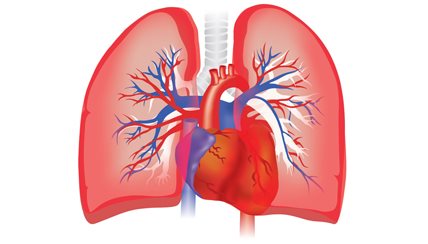
New Trial Medication for Pulmonary Arterial Hypertension
By adding a new investigational Pulmonary Arterial Hypertension (PAH) medication to your current therapy, you could experience relaxed and widened artery walls.
- Gender
- Any
- Ages
- 18-75
- Compensation
- Provided
- Time Required
- Up to 42 months

Healthy Adults Needed for Beryllium Disease Study
By participating in our study, you can help forward research on lung disease. Our researchers are hoping to learn more about the blood cells involved in the development of scarring lung diseases and create new treatment therapies.
- Gender
- Any
- Ages
- 18-80
- Compensation
- Provided
- Time Required
- 5 hours over 2 visits
.jpg?lang=en-US&ext=.jpg)
Lung Injury from Military Deployment
The purpose of this study is to learn more about lung disease found in contractors and U.S. military personnel serving in Iraq and Afghanistan after September 11, 2001.
- Gender
- Any
- Ages
- 18-70
- Compensation
- Not Provided
- Time Required
- 1 to 2 visits

Idiopathic Pulmonary Fibrosis (IPF) & GERD
The purpose of this study is to measure and accurately identify the presence and severity of gastroesphageal reflux disease (GERD), commonly called acid reflux, in idiopathic pulmonary fibrosis (IPF) patients using the Supraglottic Index (SGI).
- Gender
- Any
- Ages
- 40-95
- Compensation
- Provided
- Time Required
- 5 visits over a 6-month period, visits are every 3 months

Immune Pathways & Development of Sarcoidosis
If you are an adult with sarcoidosis who is not on immunosuppressive therapy, you may be able to help our researchers learn more about different types of sarcoidosis and how it develops.
- Gender
- Any
- Ages
- 18+
- Compensation
- Provided
- Time Required
- Up to 2 visits

Pulmonary Fibrosis & Genetic Factors
The purpose of this study is to investigate inherited genetic factors that play a role in the development of familial pulmonary fibrosis and to identify a group of genes that predispose individuals to develop pulmonary fibrosis.
- Gender
- Any
- Ages
- Not Specified
- Compensation
- Not Provided
- Time Required
- Not Specified
.jpg?lang=en-US&ext=.jpg)
Understanding Skin Problems from Eczema and Food Allergies
Researchers are studying the differences in the skin and immune cells of people with food allergies and eczema, and those without.
- Gender
- Any
- Ages
- Not Specified
- Compensation
- Provided
- Time Required
- Not Specified

Testing Blood’s Response to Foreign Substances
Researchers are conducting a study of how human blood cells work. Their goal is to examine how these cells respond to different bacteria and other foreign substances.
- Gender
- Any
- Ages
- 21-65
- Compensation
- Provided
- Time Required
- One 30-minute enrollment visit. A one-hour blood draw visit every 8-12 weeks for as long as the participant is interested.

Exploring How Parenthood Impacts Cystic Fibrosis Patients
A growing number of people with cystic fibrosis (CF) are considering parenthood. CF specialists recognize that there is a need to better support first-time parents and need input from them.
- Gender
- Any
- Ages
- 18+
- Compensation
- Provided
- Time Required
- Five years, one in person visit for enrollment, followed by surveys that can be completed remotely. Four surveys are needed during the first year, then two surveys per year for years 2-5.

FIBRONEER-SARD: Treating ILD associated with Autoimmune Disease
: With some autoimmune conditions, interstitial lung disease (ILD) can be a complication that worsens breathing and makes it harder for people to live normally. Researchers are investigating a new medication that may be able to help slow lung fibrosis in autoimmune-related ILD cases. Volunteers are needed
- Gender
- Any
- Ages
- 18+
- Compensation
- Provided
- Time Required
- 8 clinic visits over approximately 7 and ½ months
Adult Trials

AURORA Study: Preventing Further Lung Damage in IPF
Researchers are actively looking for clinical trial participants to explore the effectiveness of a new investigational idiopathic pulmonary fibrosis (IPF) treatment. Those who participate can help us work toward potentially preventing further lung damage for those affected by IPF.
- Gender
- Any
- Ages
- 40+
- Compensation
- Provided
- Time Required
- 10 visits over about 40 weeks.

New Combination Treatment Options for Non-Small Cell Lung Cancer
The COPERNICUS study needs volunteers with advanced non-small cell lung cancer. Participants will receive an investigational combination treatment to see if it can slow cancer progression.
- Gender
- Any
- Ages
- 18+
- Compensation
- Provided
- Time Required
- Up to 36 months, with 20 clinic visits over the first year, one visit every three weeks for a follow up period, and a finalization period with a visit every 12 weeks until the conclusion of the study.

Healthy Participants Needed for Lung Inflammation Study
Researchers need healthy volunteers to help study how the immune system helps the lungs repair damage from inflammatory diseases.
- Gender
- Any
- Ages
- 18-50
- Compensation
- Provided
- Time Required
- Three study visits, with the first visit lasting 1-2 hours and last two lasting about 6-8 hours each.

Potential New Treatment for Non-CF Bronchiectasis
Researchers are investigating if a new investigational drug could be the first approved treatment for non-CF bronchiectasis (NCFBE), a rare chronic lung condition. Volunteers with the disease are needed for a new study.
- Gender
- Any
- Ages
- 18-85
- Compensation
- Provided
- Time Required
- 6 study visits over at least 29 weeks

Potential New Medication for Hearing Loss from Antibiotic Use
Researchers are investigating a new medication that may be able to reduce or prevent hearing loss in patients with NTM who are treated with amikacin, a common IV antibiotic.
- Gender
- Any
- Ages
- 18-80
- Compensation
- Provided
- Time Required
- Up to 10 visits over a maximum of 129 days (roughly 3 months)

Can Skin Bacteria Treat Atopic Dermatitis?
A new study is evaluating if a type of bacteria that normally lives on the skin can help reduce eczema symptoms. Volunteers 12 years and older are needed.
- Gender
- Any
- Ages
- 12+
- Compensation
- Provided
- Time Required
- 7 study visits over approximately 20 weeks

AIM4: Testing Dupilumab with Other Asthma Treatments
Researchers want to know if combining an injectable medication called dupilumab with inhaled asthma medication can help people with uncontrolled asthma more than increasing the dose of their inhalers. Volunteers with asthma are needed for this study
- Gender
- Any
- Ages
- 18-80
- Compensation
- Provided
- Time Required
- 9 clinic visits over approximately 58 weeks

Can PAH Be Detected by Retinal Scan?
Researchers are trying to detect pulmonary arterial hypertension, or PAH, early using retinal scanning technology. Volunteers with or at risk of PAH are needed for this study.
- Gender
- Any
- Ages
- 18+
- Compensation
- Provided
- Time Required
- Two study visits over 6 months if you have PAH, or 12 months if you are at risk of PAH

ASPIRE: Potentially Slowing Lung Fibrosis in IPF
Researchers are examining whether an investigational medication called buloxibutid can slow down lung scarring and improve breathing for people with idiopathic pulmonary fibrosis (IPF). Volunteers are needed. Learn if you are eligible for the ASPIRE IPF trial
- Gender
- Any
- Ages
- 40+
- Compensation
- Provided
- Time Required
- 8 clinic visits and 8 phone or video calls over approximately 62 weeks.

Potential New Treatment for EGPA to Reduce Need for Oral Steroids
Researchers in this clinical trial want to determine if a new investigational treatment called NS-229 can help people with EGPA experience remission of their symptoms or reduce the need for oral steroids.
- Gender
- Any
- Ages
- 18+
- Compensation
- Provided
- Time Required
- 11 visits over 36 weeks (9 months). The first treatment visit will last up to 8 hours, and all other study visits will take approximately 3 hours.

Discovering New Ways to Treat Modulator-Ineligible CF
The REACH Study is a long-term, observational study aiming to gather high-quality data on people with cystic fibrosis (CF) who cannot benefit from CFTR modulators. By collecting core data, REACH will help develop and assess future therapies for this population.
- Gender
- Any
- Ages
- 12+
- Compensation
- Provided
- Time Required
- 4 clinic visits over the course of a year, at enrollment, 3 months, 6 months and 12 months.

LCI Testing Possible Tool for Identifying ILD Risks in Scleroderma Patients
Lung clearance testing may give researchers a new tool to predict people with scleroderma who are at risk of developing interstitial lung disease. Volunteers are needed for a one-visit clinical trial.
- Gender
- Any
- Ages
- 21-75
- Compensation
- Not Provided
- Time Required
- One 60-minute clinic visit, followed up by one phone call a year for the next 5 years.

Understanding Common Insomnia Treatments in Adults
Chronic insomnia is a serious health concern that affects around 10% of people in America. Current treatments are varied, and often target things that may result in sleep disruption. In this study, researchers are evaluating two common treatments for insomnia in adults to learn more about how they treat symptoms.
- Gender
- Any
- Ages
- 18+
- Compensation
- Provided
- Time Required
- Visits and home data collection over approximately 9-12 months. Some visits can occur virtually.

The MIST Clinical Study for PPF
Progressive Pulmonary Fibrosis (PPF) is a rare lung disease that causes scarring in the lung. Researchers are investigating if an inhaled study treatment can help improve lung function with fewer side effects than current treatments.
- Gender
- Any
- Ages
- 18-80
- Compensation
- Provided
- Time Required
- 12 in person visits and 1 phone visit over 56 weeks (13 months), with twice a day nebulizer treatments.

Possible New Inhaled Treatment Option for PH with ILD
Pulmonary hypertension (PH), or high blood pressure in the lungs, can often develop in those who have interstitial lung disease (ILD). Treatments for this combination of diseases, called PH-ILD, to try and improve quality of life for people with both conditions are currently being evaluated.
- Gender
- Any
- Ages
- 18-75
- Compensation
- Provided
- Time Required
- Six visits over approximately 52 weeks, with two initial visits for enrollment and then visits at weeks 8, 16, 24 and 52.

XTMAB-16: A New Drug to Reduce Steroid Use in Sarcoidosis
People with pulmonary sarcoidosis usually rely on corticosteroids to help manage symptoms. Researchers are investigating the safety of a new study drug called XTMAB-16 to see if it can help reduce corticosteroid use while treating the disease.
- Gender
- Any
- Ages
- 18-80
- Compensation
- Provided
- Time Required
- Part A: A screening period for up to 42 days, followed by 12 weeks of treatment, including up to 13 clinic visits. Part B: A screening period for up to 42 days, followed by 24 weeks of treatment, including up to 19 clinic visits. After completing either part, participants will have the option to join an extension study. They will be monitored for 6 weeks after their last dose of the medication for safety and immunogenicity assessments.

Treating Deployment-Related Asthma with Supplements
Many people returning from military deployment have developed asthma as a result of inhaling hazardous materials. Exposures to diesel, burn pits, biomass smoke and sandstorms during deployment likely play a role. Some people with deployment-related asthma do not respond well to standard asthma medications.
- Gender
- Any
- Ages
- 18-70
- Compensation
- Provided
- Time Required
- 5-6 clinic visits over 18-22 weeks

BEACON-CF: Investigational mRNA Therapy for Cystic Fibrosis
For many people living with cystic fibrosis, there are treatments available called cystic fibrosis transmembrane conductance regulator (CFTR) modulators that can help treat the underlying cause of cystic fibrosis. However, more than 5,000 people living with cystic fibrosis have a change in both of their CFTR genes that makes them not expected to benefit from CFTR modulators.
- Gender
- Any
- Ages
- 18-65
- Compensation
- Provided
- Time Required
- 28 weeks with 8 in-person visits and 4 phone calls.
.jpg?lang=en-US&ext=.jpg)
PRA023 for Systemic Sclerosis with Interstitial Lung Disease
Researchers are studying a new medication called PRA023 that has anti-inflammatory and antifibrotic properties to determine how well it works against systemic sclerosis (SSc) with interstitial lung disease (ILD).
- Gender
- Any
- Ages
- 18+
- Compensation
- Not Provided
- Time Required
- Monthly visits over 50-week timeframe
.png?lang=en-US&ext=.png)
MyAI Registry for People with Adrenal Insufficiency
To help better understand adrenal insufficiency (AI) and its progression, researchers have developed a new registry called MyAI.
- Gender
- Any
- Ages
- All Ages
- Compensation
- Not Provided
- Time Required
- Initial online survey will take 30 minutes. Follow-up surveys every six months will take five to 10 minutes. Total time involvement is 10-20 years.

Investigational Gene Therapy for Adults with CF
Adults with Cystic Fibrosis who are unable to take CFTR modulators are being asked to participate in a clinical trial for an investigational gene therapy drug known as 4D-710.
- Gender
- Any
- Ages
- 18+
- Compensation
- Provided
- Time Required
- 24 months

Predict and Prevent Lung Disease
Researchers are asking healthy adults, 25-35 years old, to join a five-year study exploring factors that may affect lung health with the goal of understanding lung disease.
- Gender
- Any
- Ages
- 25-35
- Compensation
- Provided
- Time Required
- 1 four-hour in-clinic visit, followed by remote follow up for up to 4 ½ years

Healthy People Needed for Sarcoidosis Research
Researchers are working to understand the different ways sarcoidosis, a disease that causes scarring in the lungs, develops.
- Gender
- Any
- Ages
- 18-80
- Compensation
- Provided
- Time Required
- Not Specified

Skin, Airway & Esophageal Epithelial Barriers in Youth
Researchers want to better understand if the causes of asthma, eczema, food allergies, eosinophilic esophagitis and GERD can be determined at a cellular level.
- Gender
- Any
- Ages
- 2-21
- Compensation
- Provided
- Time Required
- Not Specified

Skin Reactions to Cancer Immunotherapy
Adults with cancer who are receiving immunotherapy are needed for a new research study to understand how immunotherapy changes the body’s immune response leading to skin reactions.
- Gender
- Any
- Ages
- 18+
- Compensation
- Provided
- Time Required
- Up to 2 visits over 3 months, with possible phone follow-up after 12 months depending on cancer treatment response

Understanding Allergy Development in Infants
Researchers want to know what causes food allergies, eczema and wheezing in infants. If you’re pregnant, you may be able to help find the answer.
- Gender
- Any
- Ages
- 0-50
- Compensation
- Provided
- Time Required
- 3 in person visits and 1 telephone call, followed by 4 optional visits

Can Pembrolizumab (MK3475) with SBRT Treatment Stop or Slow Non-Small Cell Lung Cancer?
Patients with medically inoperable stage I/IIA non-small cell lung cancer (NSCLC) who have not received prior anticancer therapy for lung cancer, may qualify for a clinical trial investigating if the combination of pembrolizumab (MK-3475) and Stereotactic Body Radiation Therapy (SBRT) may help stop or slow a relapse of NSCLC compared to SBRT alone.
- Gender
- Any
- Ages
- 18+
- Compensation
- Provided
- Time Required
- Up to 7 years

Silicosis Registry
If you’ve been exposed to silica dust, like stone and concrete, you may have developed a silica-related disease. National Jewish Health is creating a registry for silicosis and related diseases in order to better understand their risk factors and prevention.
- Gender
- Any
- Ages
- 18+
- Compensation
- Provided
- Time Required
- 1 clinic or phone visit lasting 1 hour, as well as 15 minute follow-up phone interviews once a year after initial visit

Atopic Dermatitis & Skin Infections
National Jewish Health researchers are trying to determine why people with atopic dermatitis or eczema are more susceptible to bacterial infections. Learn how you can participate in our research study.
- Gender
- Any
- Ages
- 18-65
- Compensation
- Provided
- Time Required
- Up to 3 visits or approximately 3 hours

Identifying Characteristics and Patterns of Asthma
Our researchers are working to identify the clinical, physiologic, genetic and molecular characteristics of asthmatics.
- Gender
- Any
- Ages
- 5+
- Compensation
- Provided
- Time Required
- 2-4 office visits and up to 3 follow up phone calls

New Trial Medication for Pulmonary Arterial Hypertension
By adding a new investigational Pulmonary Arterial Hypertension (PAH) medication to your current therapy, you could experience relaxed and widened artery walls.
- Gender
- Any
- Ages
- 18-75
- Compensation
- Provided
- Time Required
- Up to 42 months

Healthy Adults Needed for Beryllium Disease Study
By participating in our study, you can help forward research on lung disease. Our researchers are hoping to learn more about the blood cells involved in the development of scarring lung diseases and create new treatment therapies.
- Gender
- Any
- Ages
- 18-80
- Compensation
- Provided
- Time Required
- 5 hours over 2 visits
.jpg?lang=en-US&ext=.jpg)
Lung Injury from Military Deployment
The purpose of this study is to learn more about lung disease found in contractors and U.S. military personnel serving in Iraq and Afghanistan after September 11, 2001.
- Gender
- Any
- Ages
- 18-70
- Compensation
- Not Provided
- Time Required
- 1 to 2 visits

Idiopathic Pulmonary Fibrosis (IPF) & GERD
The purpose of this study is to measure and accurately identify the presence and severity of gastroesphageal reflux disease (GERD), commonly called acid reflux, in idiopathic pulmonary fibrosis (IPF) patients using the Supraglottic Index (SGI).
- Gender
- Any
- Ages
- 40-95
- Compensation
- Provided
- Time Required
- 5 visits over a 6-month period, visits are every 3 months

Immune Pathways & Development of Sarcoidosis
If you are an adult with sarcoidosis who is not on immunosuppressive therapy, you may be able to help our researchers learn more about different types of sarcoidosis and how it develops.
- Gender
- Any
- Ages
- 18+
- Compensation
- Provided
- Time Required
- Up to 2 visits

Pulmonary Fibrosis & Genetic Factors
The purpose of this study is to investigate inherited genetic factors that play a role in the development of familial pulmonary fibrosis and to identify a group of genes that predispose individuals to develop pulmonary fibrosis.
- Gender
- Any
- Ages
- Not Specified
- Compensation
- Not Provided
- Time Required
- Not Specified
.jpg?lang=en-US&ext=.jpg)
Understanding Skin Problems from Eczema and Food Allergies
Researchers are studying the differences in the skin and immune cells of people with food allergies and eczema, and those without.
- Gender
- Any
- Ages
- Not Specified
- Compensation
- Provided
- Time Required
- Not Specified

Testing Blood’s Response to Foreign Substances
Researchers are conducting a study of how human blood cells work. Their goal is to examine how these cells respond to different bacteria and other foreign substances.
- Gender
- Any
- Ages
- 21-65
- Compensation
- Provided
- Time Required
- One 30-minute enrollment visit. A one-hour blood draw visit every 8-12 weeks for as long as the participant is interested.

Exploring How Parenthood Impacts Cystic Fibrosis Patients
A growing number of people with cystic fibrosis (CF) are considering parenthood. CF specialists recognize that there is a need to better support first-time parents and need input from them.
- Gender
- Any
- Ages
- 18+
- Compensation
- Provided
- Time Required
- Five years, one in person visit for enrollment, followed by surveys that can be completed remotely. Four surveys are needed during the first year, then two surveys per year for years 2-5.

FIBRONEER-SARD: Treating ILD associated with Autoimmune Disease
: With some autoimmune conditions, interstitial lung disease (ILD) can be a complication that worsens breathing and makes it harder for people to live normally. Researchers are investigating a new medication that may be able to help slow lung fibrosis in autoimmune-related ILD cases. Volunteers are needed
- Gender
- Any
- Ages
- 18+
- Compensation
- Provided
- Time Required
- 8 clinic visits over approximately 7 and ½ months
Pediatric Trials

Exploring New Investigational Topical Treatment for Moderate Eczema
Researchers are investigating a potential new, non-steroid skin cream for moderate eczema in children and teens who have not responded well to other topical eczema treatments. Volunteers are needed. Learn how your child can participate.
- Gender
- Any
- Ages
- 6-17
- Compensation
- Provided
- Time Required
- up to 16 clinic visits over 70 weeks

Can Skin Bacteria Treat Atopic Dermatitis?
A new study is evaluating if a type of bacteria that normally lives on the skin can help reduce eczema symptoms. Volunteers 12 years and older are needed.
- Gender
- Any
- Ages
- 12+
- Compensation
- Provided
- Time Required
- 7 study visits over approximately 20 weeks

Discovering New Ways to Treat Modulator-Ineligible CF
The REACH Study is a long-term, observational study aiming to gather high-quality data on people with cystic fibrosis (CF) who cannot benefit from CFTR modulators. By collecting core data, REACH will help develop and assess future therapies for this population.
- Gender
- Any
- Ages
- 12+
- Compensation
- Provided
- Time Required
- 4 clinic visits over the course of a year, at enrollment, 3 months, 6 months and 12 months.

Can Combination Rescue Inhalers help Adolescents Control Asthma Flare Ups?
Researchers with the ACADIA Study are trying to determine if a rescue inhaler that doctors can currently prescribe for adults can also help adolescents control their asthma flare-ups. Volunteers are needed. Learn if you are eligible:
- Gender
- Any
- Ages
- 12-18
- Compensation
- Provided
- Time Required
- Approximately 58 weeks (13 months).
.png?lang=en-US&ext=.png)
MyAI Registry for People with Adrenal Insufficiency
To help better understand adrenal insufficiency (AI) and its progression, researchers have developed a new registry called MyAI.
- Gender
- Any
- Ages
- All Ages
- Compensation
- Not Provided
- Time Required
- Initial online survey will take 30 minutes. Follow-up surveys every six months will take five to 10 minutes. Total time involvement is 10-20 years.

Skin, Airway & Esophageal Epithelial Barriers in Youth
Researchers want to better understand if the causes of asthma, eczema, food allergies, eosinophilic esophagitis and GERD can be determined at a cellular level.
- Gender
- Any
- Ages
- 2-21
- Compensation
- Provided
- Time Required
- Not Specified

Understanding Allergy Development in Infants
Researchers want to know what causes food allergies, eczema and wheezing in infants. If you’re pregnant, you may be able to help find the answer.
- Gender
- Any
- Ages
- 0-50
- Compensation
- Provided
- Time Required
- 3 in person visits and 1 telephone call, followed by 4 optional visits

Identifying Characteristics and Patterns of Asthma
Our researchers are working to identify the clinical, physiologic, genetic and molecular characteristics of asthmatics.
- Gender
- Any
- Ages
- 5+
- Compensation
- Provided
- Time Required
- 2-4 office visits and up to 3 follow up phone calls
.jpg?lang=en-US&ext=.jpg)
Understanding Skin Problems from Eczema and Food Allergies
Researchers are studying the differences in the skin and immune cells of people with food allergies and eczema, and those without.
- Gender
- Any
- Ages
- Not Specified
- Compensation
- Provided
- Time Required
- Not Specified
Healthy Participant Trials

Exploring New Investigational Topical Treatment for Moderate Eczema
Researchers are investigating a potential new, non-steroid skin cream for moderate eczema in children and teens who have not responded well to other topical eczema treatments. Volunteers are needed. Learn how your child can participate.
- Gender
- Any
- Ages
- 6-17
- Compensation
- Provided
- Time Required
- up to 16 clinic visits over 70 weeks

AURORA Study: Preventing Further Lung Damage in IPF
Researchers are actively looking for clinical trial participants to explore the effectiveness of a new investigational idiopathic pulmonary fibrosis (IPF) treatment. Those who participate can help us work toward potentially preventing further lung damage for those affected by IPF.
- Gender
- Any
- Ages
- 40+
- Compensation
- Provided
- Time Required
- 10 visits over about 40 weeks.

New Combination Treatment Options for Non-Small Cell Lung Cancer
The COPERNICUS study needs volunteers with advanced non-small cell lung cancer. Participants will receive an investigational combination treatment to see if it can slow cancer progression.
- Gender
- Any
- Ages
- 18+
- Compensation
- Provided
- Time Required
- Up to 36 months, with 20 clinic visits over the first year, one visit every three weeks for a follow up period, and a finalization period with a visit every 12 weeks until the conclusion of the study.

Healthy Participants Needed for Lung Inflammation Study
Researchers need healthy volunteers to help study how the immune system helps the lungs repair damage from inflammatory diseases.
- Gender
- Any
- Ages
- 18-50
- Compensation
- Provided
- Time Required
- Three study visits, with the first visit lasting 1-2 hours and last two lasting about 6-8 hours each.

Potential New Treatment for Non-CF Bronchiectasis
Researchers are investigating if a new investigational drug could be the first approved treatment for non-CF bronchiectasis (NCFBE), a rare chronic lung condition. Volunteers with the disease are needed for a new study.
- Gender
- Any
- Ages
- 18-85
- Compensation
- Provided
- Time Required
- 6 study visits over at least 29 weeks

Potential New Medication for Hearing Loss from Antibiotic Use
Researchers are investigating a new medication that may be able to reduce or prevent hearing loss in patients with NTM who are treated with amikacin, a common IV antibiotic.
- Gender
- Any
- Ages
- 18-80
- Compensation
- Provided
- Time Required
- Up to 10 visits over a maximum of 129 days (roughly 3 months)

Can Skin Bacteria Treat Atopic Dermatitis?
A new study is evaluating if a type of bacteria that normally lives on the skin can help reduce eczema symptoms. Volunteers 12 years and older are needed.
- Gender
- Any
- Ages
- 12+
- Compensation
- Provided
- Time Required
- 7 study visits over approximately 20 weeks

AIM4: Testing Dupilumab with Other Asthma Treatments
Researchers want to know if combining an injectable medication called dupilumab with inhaled asthma medication can help people with uncontrolled asthma more than increasing the dose of their inhalers. Volunteers with asthma are needed for this study
- Gender
- Any
- Ages
- 18-80
- Compensation
- Provided
- Time Required
- 9 clinic visits over approximately 58 weeks

Understanding Common Insomnia Treatments in Adults
Chronic insomnia is a serious health concern that affects around 10% of people in America. Current treatments are varied, and often target things that may result in sleep disruption. In this study, researchers are evaluating two common treatments for insomnia in adults to learn more about how they treat symptoms.
- Gender
- Any
- Ages
- 18+
- Compensation
- Provided
- Time Required
- Visits and home data collection over approximately 9-12 months. Some visits can occur virtually.

The MIST Clinical Study for PPF
Progressive Pulmonary Fibrosis (PPF) is a rare lung disease that causes scarring in the lung. Researchers are investigating if an inhaled study treatment can help improve lung function with fewer side effects than current treatments.
- Gender
- Any
- Ages
- 18-80
- Compensation
- Provided
- Time Required
- 12 in person visits and 1 phone visit over 56 weeks (13 months), with twice a day nebulizer treatments.

Possible New Inhaled Treatment Option for PH with ILD
Pulmonary hypertension (PH), or high blood pressure in the lungs, can often develop in those who have interstitial lung disease (ILD). Treatments for this combination of diseases, called PH-ILD, to try and improve quality of life for people with both conditions are currently being evaluated.
- Gender
- Any
- Ages
- 18-75
- Compensation
- Provided
- Time Required
- Six visits over approximately 52 weeks, with two initial visits for enrollment and then visits at weeks 8, 16, 24 and 52.
.jpg?lang=en-US&ext=.jpg)
PRA023 for Systemic Sclerosis with Interstitial Lung Disease
Researchers are studying a new medication called PRA023 that has anti-inflammatory and antifibrotic properties to determine how well it works against systemic sclerosis (SSc) with interstitial lung disease (ILD).
- Gender
- Any
- Ages
- 18+
- Compensation
- Not Provided
- Time Required
- Monthly visits over 50-week timeframe
.png?lang=en-US&ext=.png)
MyAI Registry for People with Adrenal Insufficiency
To help better understand adrenal insufficiency (AI) and its progression, researchers have developed a new registry called MyAI.
- Gender
- Any
- Ages
- All Ages
- Compensation
- Not Provided
- Time Required
- Initial online survey will take 30 minutes. Follow-up surveys every six months will take five to 10 minutes. Total time involvement is 10-20 years.

Predict and Prevent Lung Disease
Researchers are asking healthy adults, 25-35 years old, to join a five-year study exploring factors that may affect lung health with the goal of understanding lung disease.
- Gender
- Any
- Ages
- 25-35
- Compensation
- Provided
- Time Required
- 1 four-hour in-clinic visit, followed by remote follow up for up to 4 ½ years

Healthy People Needed for Sarcoidosis Research
Researchers are working to understand the different ways sarcoidosis, a disease that causes scarring in the lungs, develops.
- Gender
- Any
- Ages
- 18-80
- Compensation
- Provided
- Time Required
- Not Specified

Atopic Dermatitis & Skin Infections
National Jewish Health researchers are trying to determine why people with atopic dermatitis or eczema are more susceptible to bacterial infections. Learn how you can participate in our research study.
- Gender
- Any
- Ages
- 18-65
- Compensation
- Provided
- Time Required
- Up to 3 visits or approximately 3 hours
.jpg?lang=en-US&ext=.jpg)
Understanding Skin Problems from Eczema and Food Allergies
Researchers are studying the differences in the skin and immune cells of people with food allergies and eczema, and those without.
- Gender
- Any
- Ages
- Not Specified
- Compensation
- Provided
- Time Required
- Not Specified

Testing Blood’s Response to Foreign Substances
Researchers are conducting a study of how human blood cells work. Their goal is to examine how these cells respond to different bacteria and other foreign substances.
- Gender
- Any
- Ages
- 21-65
- Compensation
- Provided
- Time Required
- One 30-minute enrollment visit. A one-hour blood draw visit every 8-12 weeks for as long as the participant is interested.

FIBRONEER-SARD: Treating ILD associated with Autoimmune Disease
: With some autoimmune conditions, interstitial lung disease (ILD) can be a complication that worsens breathing and makes it harder for people to live normally. Researchers are investigating a new medication that may be able to help slow lung fibrosis in autoimmune-related ILD cases. Volunteers are needed
- Gender
- Any
- Ages
- 18+
- Compensation
- Provided
- Time Required
- 8 clinic visits over approximately 7 and ½ months
